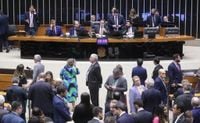The political landscape in Brazil has been rocked by a controversial decision from the Chamber of Deputies, which voted to suspend the criminal proceedings against Deputy Alexandre Ramagem, a member of the Liberal Party (PL-RJ), who is facing serious charges including participation in an attempted coup d'état. On May 7, 2025, the Chamber approved the proposal with a significant majority, recording 315 votes in favor and 143 against, a move that has prompted widespread debate about the implications for the rule of law and the separation of powers in Brazil.
Ramagem is currently a defendant in the Supreme Federal Court (STF) due to accusations of involvement in a scheme aimed at maintaining former President Jair Bolsonaro in power following his electoral defeat. The proposal to suspend the criminal action was presented by Deputy Alfredo Gaspar from the União party and was backed by a coalition of lawmakers, including members of the Centrão, a powerful bloc in Brazilian politics.
Under Article 53 of the Brazilian Constitution, the Chamber has the authority to suspend criminal actions against deputies for crimes committed after their election. However, the STF had previously indicated that only actions related to crimes occurring after Ramagem's swearing-in as a deputy in December 2022 could be suspended. This means that the other charges against him, including armed criminal association and coup d'état, could still proceed in court.
Minister Cristiano Zanin of the STF had already communicated to President Hugo Motta of the Chamber that a full suspension of the proceedings was not permissible. Despite this warning, the Chamber moved forward with the vote, leading to a direct confrontation between the legislative and judicial branches of government.
The resolution passed by the Chamber has sparked a heated political debate, as it not only affects Ramagem but also has implications for other defendants in the same inquiry, including Bolsonaro and several former ministers. Critics argue that this decision represents an attempt to shield powerful political figures from accountability.
In a statement following the vote, Ramagem's defenders claimed that the resolution was necessary to uphold the constitutional rights of elected officials. They argued that the legislative body must have the prerogative to protect its members from what they perceive as overreach by the judiciary. “This is a matter of legislative prerogative,” stated Deputy Gaspar, emphasizing that the proposal aims to ensure that all accused parties are treated equally under the law.
However, opponents of the resolution, including members of the Workers' Party (PT), have lambasted the move as a blatant attempt to undermine the judicial process. Lindbergh Farias, the PT leader in the Chamber, warned that the proposal could lead to a constitutional crisis, stating, "The court will annul this measure. No one here is challenging the Supreme Court; this will be completely disregarded."
As the political fallout continues, Minister Alexandre de Moraes of the STF has called for an extraordinary session of the First Panel to review the Chamber's decision. He emphasized that the ongoing legal proceedings against Ramagem would continue as normal until the STF reaches a resolution. The court's stance is clear: it maintains that the legislative body's suspension does not extend to all charges, particularly those that occurred before Ramagem's election.
The ramifications of this decision could be significant, not just for Ramagem but for the broader political landscape in Brazil. The STF's authority has been challenged, and many are questioning whether the legislative branch can effectively shield its members from criminal accountability.
As the situation develops, it remains to be seen how the STF will respond to the Chamber's actions. The court has indicated that it will not easily acquiesce to legislative maneuvers designed to obstruct justice. Legal experts suggest that the STF may ultimately rule against the Chamber's decision, reinforcing the judiciary's role in overseeing the legal processes involving elected officials.
In summary, the decision by the Chamber of Deputies to suspend criminal proceedings against Alexandre Ramagem has ignited a fierce debate about the balance of power in Brazilian politics. With the STF poised to respond, the coming weeks are likely to be marked by intense scrutiny and further developments in this high-stakes political drama.



